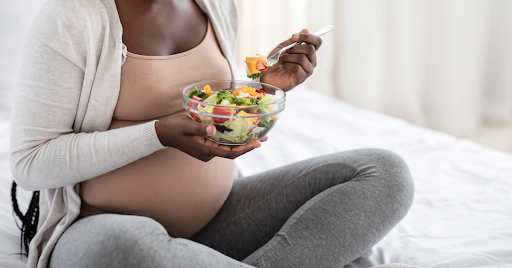The rush of emotions after finding out you are pregnant can leave you feeling on top of the world. Suddenly, you want to do everything in your power to help protect and grow your little one. That may leave you questioning the best ways to balance pregnancy and nutrition. Ideally, a healthy diet before pregnancy is best, but it is never too late to start!
The Benefits Of Proper Nutrition During Pregnancy
When you’re pregnant, a healthy and balanced diet becomes more important than ever. Here at Raleigh OB/GYN, we understand that nutrients are what help your baby grow and develop. Don’t know where to start when it comes to pregnancy and nutrition? Continue reading to learn the basics!
Ensure A Balanced Diet
During your pregnancy, you need more of certain vitamins and nutrients such as protein, folic acid, iron, iodine, and calcium. Eating a balanced diet full of variety is a great way to ensure you are meeting you and your baby’s nutrient needs. Some foods that are sure to help you meet your dietary needs include:
- Fortified cereals: High in folate or folic acid, calcium, and iron
- Milk: High in calcium, vitamin D, and protein
- Fish: High in calcium and vitamin D
- Spinach: High in iron, calcium, and folic acid
- Beans: High in vitamin B, iron, folic acid, and protein
The specific nutrients listed above are among some of the ones that deserve special attention throughout your pregnancy. However, if you aren’t getting a sufficient amount from food, there are ways to make up for it— like prenatal vitamins.
Appropriate Vitamin Supplements
Generally speaking, pregnant women should be taking a prenatal vitamin every day. This, along with a healthy and balanced diet, should supply all the vitamins and minerals you need during pregnancy. A prenatal vitamin, according to the American College of Obstetrics and Gynecologists, should contain these 11 nutrients: folate, iron, choline, omega-3 fatty acids, vitamin C, vitamin A, vitamin B6, vitamin B12, calcium, and vitamin D.
These vitamins may help to prevent major congenital disabilities, support the development of the placenta and fetus, develop healthy skin, gums, and eyesight, and helps to build your fetus’s bones and teeth. At a very minimum, mothers-to-be should be ensuring they are taking the suggested intake of roughly 600mcg of folic acid and 27 mg of iron daily.
Dietary and Caloric Recommendations
ACOG suggests that women pregnant with one baby should be consuming an extra 340 calories per day starting in the second trimester and a bit more in the third trimester. Women carrying twins should consume roughly 600 extra calories daily, and women with triples should consume an extra 900 calories daily.
Keep in mind the saying “eat for two” is not true, and eating an excess amount of calories can lead to serious health implications. Some reasons to avoid unrestricted calorie intake while pregnant are:
- Excess weight gain
- Gestational diabetes
- Emergency C-section
- Heartburn
- Pre-eclampsia
In order to limit overeating, try exercising daily, keeping yourself hydrated, and sticking to a healthy and well-rounded diet.
Eating Safely During Pregnancy
Did you know that some foods contain harmful bacteria and viruses that can affect the health of your unborn baby? The Mayo Clinic suggests steering clear of certain foods during these nine months:
- Raw, undercooked, or contaminated seafood, poultry, and eggs
- Unpasteurized foods
- Unwashed fruits and vegetables
- Excess caffeine, herbal tea, and alcohol
Have no fear, once your baby makes its grand entrance, you can return to eating sushi and drinking all the coffee your heart desires.
There are often a lot of questions revolving around pregnancy and nutrition, including what and how much you should be eating. Raleigh OB/GYN has over 45 years of experience serving the women in our communities. If you have questions about how to best fuel your body, especially during pregnancy, set up an appointment to talk to your doctor. You can schedule an appointment through our website or give us a call at (919) 876-8225.


